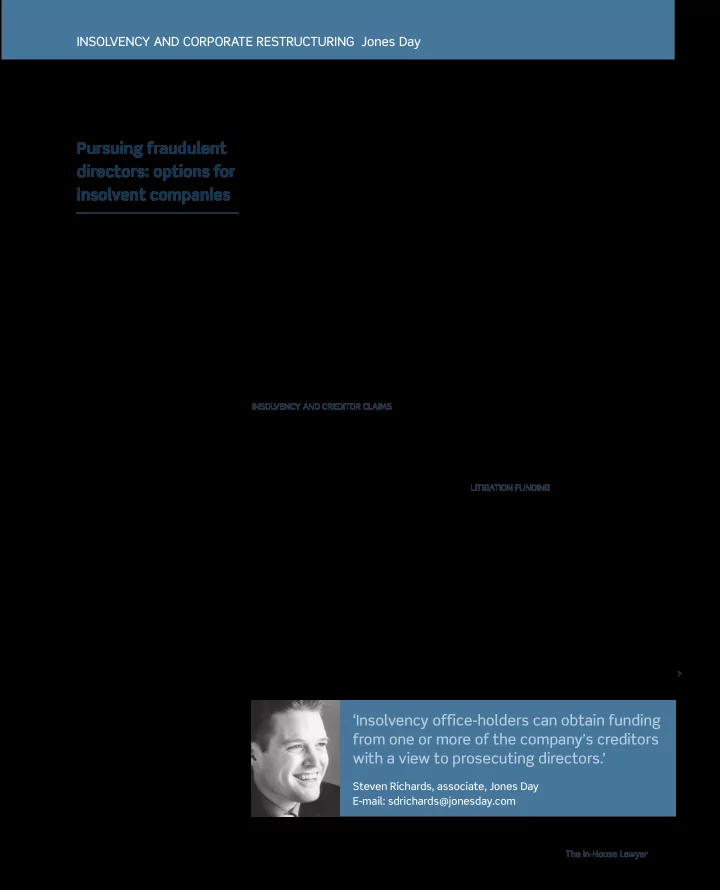

INSOLVENCY AND CORPORATE RESTRUCTURING Jones Day Pursuing fraudulent THE PROVISIONS OF THE COMPANIES ACT 2006 HAVE s425 of the Companies Act 1985). Such an sought to codify and expand upon the current arrangement was recently approved by the court directors: options for common law and equitable duties owed by company in Langbar International Ltd [2006]. directors. While it is hoped that these provisions will insolvent companies clarify the scope of such responsibilities, there will Compromise arrangements – Langbar inevitably be a minority of directors who will A number of Langbar’s shareholders had purchased continue to disregard their duties and pursue shares in reliance on market announcements dishonest schemes. Such behaviour is of particular misrepresenting the company’s asset position. The concern in small, private companies where the shares were subsequently suspended from trading director in question often has full control over the on the Alternative Investment Market and Langbar management of the business. The wrongful acts was exposed to potential and significant claims may only come to light after the company has been from the shareholders for their resulting losses. forced into financial difficulty and the director may hope that a sophisticated and comprehensive fraud Under the terms of the compromise arrangement, will leave the company with little appetite or the shareholders agreed not to bring proceedings resources to litigate the matter. against Langbar and also agreed to assign to Langbar any claims that they may have against the This briefing examines a number of ways in which directors believed to be ultimately responsible. In the law has developed and can be used to assist return, Langbar was obliged to pursue both the impecunious and insolvent companies in the pursuit company and shareholder claims against the of fraudulent directors. directors at its own cost and to distribute the net proceeds in accordance with the terms of the INSOLVENCY AND CREDITOR CLAIMS arrangement. Those managing a company left in financial difficulty as a result of a director’s misconduct will As a result, Langbar was able to protect itself from first need to consider the company’s solvency and potential insolvency and at the same time the associated issues. The directors may conclude, strengthen the basis and scope of the claims following advice, that it is necessary to place the brought in its name against the directors. company into administration or liquidation. In terms of pursuing claims against the directors, the LITIGATION FUNDING appointment of an insolvency office-holder can Those acting on behalf of a company in financial often be a distinct advantage. As explained in this difficulty will then need to consider how to fund any briefing, a liquidator, for example, has vested in potential claims against a dishonest director. Often, them a wide range of statutory powers and causes they will need to look to third parties to help fund of action that are not available to solvent the costs of litigation in return for a percentage of companies. These in turn can facilitate the any damages awarded. prosecution of past and present directors. Traditionally, the English courts have been reluctant However, the management of the company may to sanction the support of claims by independent want to avoid an insolvency process and look to parties with no legitimate interest in the outcome. As consider how the company’s financial status can be an exception, it is now reasonably well established preserved. As an alternative to insolvency, a that insolvency office-holders can obtain funding company may be able to ask the court to sanction a from one or more of the company’s creditors with a compromise arrangement entered into with its view to prosecuting directors and restoring the creditors or a class of creditors pursuant to company’s assets. In addition, s58 of the Courts and ss895-899 of the Companies Act 2006 (formerly Legal Services Act 1990 permits liquidators and > ‘Insolvency office-holders can obtain funding from one or more of the company’s creditors with a view to prosecuting directors.’ Steven Richards, associate, Jones Day E-mail: sdrichards@jonesday.com June 2008 The In-House Lawyer 63
Recommend
More recommend